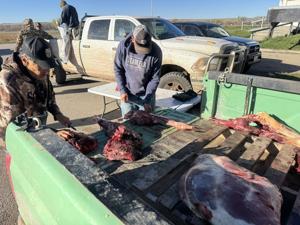In a proactive move to secure food sources, tribes in Montana distributed fresh elk meat to residents of Wyola on the Crow Indian Reservation just days before a significant reduction in food benefits. This distribution occurred on October 15, 2023, as the political stalemate in Washington, D.C., threatened to halt the Supplemental Nutrition Assistance Program (SNAP) for many families.
The event drew dozens of community members who benefited from the initiative. The local tribes organized the meat distribution in response to the impending cuts to SNAP, which provides crucial assistance to low-income households. With the potential cessation of these benefits looming, the tribes took swift action to ensure that their community would have access to nutritious food.
Community Response to SNAP Uncertainty
The decision to distribute elk meat highlights the resilience of the tribes and their commitment to supporting their communities during challenging times. “We recognize the need for sustainable food sources, especially when government programs are uncertain,” said a representative of the Crow Nation. The distribution not only provided immediate relief but also emphasized the importance of traditional food sources in promoting self-sufficiency.
SNAP benefits have been a lifeline for many families, and the threat of cuts has raised concerns among residents. The political gridlock in Congress has left many unsure of their food security as negotiations over the budget continue. The tribes’ initiative serves as a reminder of the vital role local organizations play in addressing food insecurity.
Looking Ahead: Food Security Initiatives
As the political situation evolves, the tribes are planning to implement further initiatives aimed at enhancing food security. These include community gardens and educational programs focused on sustainable farming practices. By investing in local agriculture, the tribes aim to reduce reliance on external food sources and foster a stronger connection to their land.
The distribution of elk meat not only provided immediate relief but also sparked discussions on food sovereignty and the importance of indigenous practices in modern society. With the potential for further cuts to SNAP benefits on the horizon, the actions taken by the Montana tribes exemplify a community-driven approach to tackling food insecurity.
The situation remains fluid as Congress continues to negotiate. However, the proactive measures taken by the Crow Indian Reservation and other tribes in Montana underscore a commitment to ensuring that no family goes hungry, regardless of political challenges. As the community rallies together, their efforts highlight the critical intersection of culture, community, and sustainable food practices in addressing contemporary challenges.







